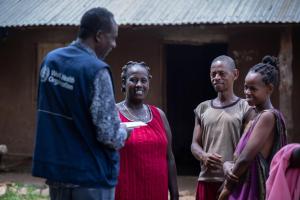WHO field hubs strengthen health systems and emergency response in Ethiopia
Ethiopia has endured multiple humanitarian situations recently, from conflict and displacement to disease outbreaks and climate shocks. These challenges have created a prolonged humanitarian situation, leaving over a million people displaced or in returnee status and straining access to essential health services.
In response, WHO Ethiopia Country Office embarked on a groundbreaking decentralization initiative, transforming the way it supports health systems across the country. Guided by a comprehensive functional review, WHO established six regional field hubs designed to strengthen collaboration with local health authorities, accelerate emergency response, and improve health outcomes for affected populations.
“These field hubs are already yielding positive results,” said Mohammed Adem Maalin, WHO Field Hub Coordinator for Somali, Harari, and Dire Dawa regions. “They bring our support closer to the people and enable us to act quickly and effectively.”
Decentralized Support Across Regions
The six operational hubs are strategically located in:
- Addis Ababa (Oromia and Addis Ababa)
- Jijiga (Somali, Harari, Dire Dawa)
- Mekelle (Tigray, Afar)
- Bahir Dar (Amhara, Benishangul-Gumuz)
- Hawassa (South Ethiopia, Central Ethiopia, Sidama)
- Gambella (Gambella, Southwest )
Each hub is equipped with dedicated staff and resources to provide real-time support, improve emergency coordination, and implement high-quality health interventions. They have played a pivotal role in responding to disease outbreaks, supporting internally displaced persons, and contributing to long-term resilience building—especially in conflict-affected regions of Northern Ethiopia.
Key Achievements and Lessons Learned
- Operational Effectiveness: Proximity to local communities has enabled quicker and more localized responses to emergencies.
- Program Efficiency: Stronger partnerships with local health authorities have improved alignment with community needs.
- Sustainable Coordination: Continuous engagement with regional actors has enhanced program coherence and adaptability.
- Resilience Building: Long-term recovery efforts have been bolstered through a focus on strengthening health systems.
Looking ahead, WHO plans to:
- Strengthen government leadership at regional and district levels.
- Rehabilitate health infrastructure and improve access to services.
- Support routine immunizations and emergency care for malnutrition and outbreaks.
- Improve health data systems and pharmaceutical supply chains.
- Mobilize resources to close a $15.5 million funding gap needed to sustain these initiatives.
A formal review of the Country Cooperation Strategy will also be undertaken to align with WHO’s Fourteenth General Programme of Work (GPW14), ensuring that Ethiopia’s health priorities remain at the heart of WHO’s global commitments.
Through this decentralized approach, WHO has created a more agile and responsive health system, setting a powerful example for other countries facing complex health emergencies. With continued support and strategic investment, the initiative promises to build a healthier and more resilient Ethiopia—one field hub at a time.
Technical Contact
Innocent Komakech
Hub Coordinator
